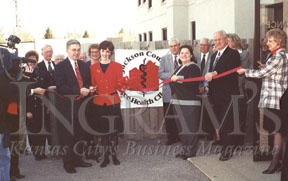by judy z. ellett
Part of the Solution
Truman Heartland Community Foundation

Appearing at the April 2000 opening of the Jackson County Free Health
Clinic are (l to r):
Dr. Paul Williams, Wilma Eskridge, Dr. Dan Purdom, Dr. Don McCandless,
Barbara Potts, Dr. Bridget McCandless—medical director of the all-volunteer
program, Dr. Paul Thomson, Katheryn Shields, Dr. Dwayne Holder, Helen
French, Bill Baker, Kristie Agee, Dr. Donald Potts and Liz McClure.
Paul Thomson, president and CEO of the Truman
Heartland Community Foundation, sees his organization as more than a conduit
for charitable contributions. The ultimate mission of the Truman Heartland
Community Foundation is to connect local donors in Jackson County—specifically
Eastern Jackson County—with the local causes that interest them,
he says, but beyond that he sees the foundation as an initiator of solutions.
Like the time, for instance, when Marie Coker of California found herself
in charge of her brother’s estate, which included the aging Emerson
Hotel at 2017 E. Linwood Blvd. The hotel had turned into a drug house,
and Thomson believes there may even have been a murder or two there.
Coker and her attorney had been able to dispose of all the assets in the
estate except this one, and that’s when they turned to Thomson to
see if the foundation would accept the note on the hotel as a gift. He
discovered, unbeknownst to them, that the city was taking bids to demolish
the structure, and they had a short timeframe before the building would
fall to the wrecking ball. He found a buyer on the Thursday before the
bids were to be opened, a fair price was negotiated, and the buyer took
possession of the property on the city’s Friday deadline. The buyer,
a developer who specializes in rehabilitating old properties for low-income
residents, got a bargain price of $50,000, and the Truman Heartland Community
Foundation got a $50,000 donation.
"We have the wherewithal to handle noncash contributions," Thomson
says in something of an understatement. "We make charitable giving
easy, flexible and effective."
The foundation provides flexibility through a variety of vehicles: donor-advised
funds, designated funds, unrestricted funds, or field of interest/scholarship
funds. Charitable gift annuity funds and charitable remainder trusts are
ways that patrons can invest for themselves and give to others at the
same time.
Although the Truman Heartland Community Foundation saw the value of certain
sectors of its investment portfolio drop in 2001, as almost every foundation
did, the year was its second highest in the amount of contributions it
received. In a year that was tough for charitable giving, Truman saw its
assets top $20 million, and it paid out almost $1.4 million in grants—100
times more than what it made in its inaugural year of 1982.
"If you focus on the donor and the community," says Thomson,
"the growth takes care of itself."
Often it is the donors who see problems in the community that others don’t.
If a solution doesn’t exist for a problem, the foundation can help
a donor create one. Such observations led to the creation of the Jackson
County Free Health Clinic in Independence for uninsured adults with chronic
health conditions like diabetes and asthma. The clinic operates out of
the Jackson County Health Department facility at night; patients can go
there to see a doctor and to get the prescription drugs they need. Thomson
says he has no trouble getting contributions for this program.
The foundation and its donors also have developed a transportation program
for the disabled and elderly in cooperation with the city of Independence
and with contributions from Health Midwest. It has partnered with the
Lions Club and negotiated with the LensCrafters Foundation to provide
eye exams and glasses for the low price of $39 to those who wouldn’t
be able to afford eye care any other way. The list goes on and on.
Thomson says the challenges that face Truman Heartland include staying
appraised of the needs of the community, covering all of suburban Jackson
County with a three-person staff, and letting people know about the foundation
on its limited marketing budget. As for the foundation’s goals, the
answer comes to Thomson easily.
"Our goal is to bring donors into philanthropy and to educate them,"
he says, "until they evolve from people who make contributions to
people who make a difference."